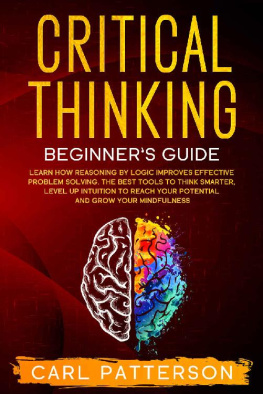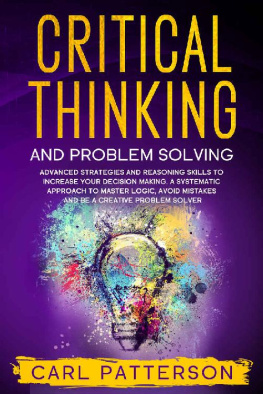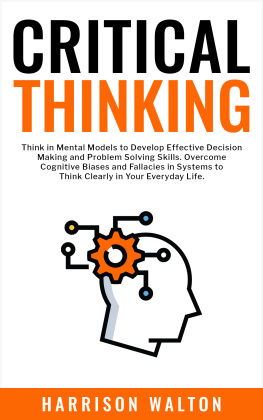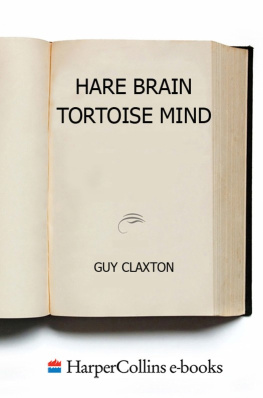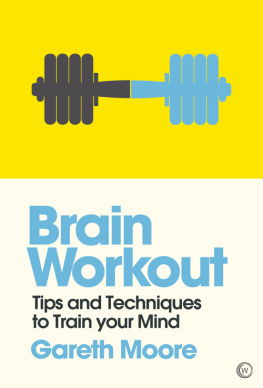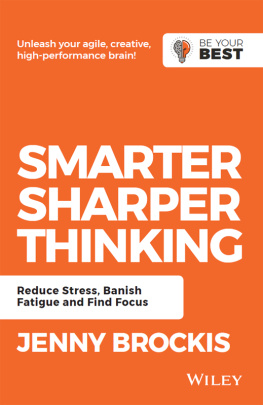BOOST YOUR IQ
Thinking is the hardest work there is, which is probably the reason so few engage in it.
Henry Ford (18631947)
Ron Bracey
BOOST YOUR IQ
Tips and Techniques
for a Sharper Mind
CONTENTS
TO TAFFIN, MER MER AND JIMMY,
THE MOST INTELLIGENT PEOPLE I KNOW
INTRODUCTION
From babyhood our intellectual development is monitored to make sure were making normal progress. During our school years IQ tests may be used to select us for fast-track or remedial teaching and determine whether we enter further education. At work, IQ assessments may be part of the selection and promotion processes. They are also used to diagnose dementia or to measure the effects of brain injury and to monitor recovery; they may even be used to determine whether someone is fit to go to prison.
Even if youre never formally tested as an adult, your intellect, and especially the uses you make of it, has an influence on many areas of your life. It influences the work you do (and how well you do it); it affects your comprehension of what is going on in our fast-moving world and how effectively you are able to interact with its complexities; it even colours, rightly or wrongly, how other people view you and respond to you.
As we shall see in , intelligence can be defined in a variety of different ways, but how has the intelligence quotient, IQ as a measurement, arisen?
THE EVOLUTION OF IQ
The notion of IQ was developed by Frenchman Alfred Binet in the early 20th century to help determine how much additional educational assistance children with special needs might require. His idea was so successful it quickly came into wider use to assess such things as educational progress and to match people with certain kinds of jobs. A formula for children was devised:
However, this was not workable for adults, for whom a system of averaging is used (see ).
In the course of a century, the concept of IQ has evolved to transcend Binets narrowly psychometric approach. The idea of the general intelligence factor, or g, came into circulation at much the same time as Binets assessment. Although g took account of the fact that intelligence is made up of various factors, including heredity, it still missed out the important contributions of social and cultural influences. One development of g involved classifying intelligence into fluid and crystallized IQ. Fluid IQ is an innate ability to learn, reason and solve problems, while crystallized IQ is the store of specific knowledge that we acquire through learning and experience.
Two further developments in the interpretation of what constitutes intelligence have had a marked effect in the past 25 years. In his groundbreaking book Frames of Mind: The Theory of Multiple Intelligences (1983), Harvard psychologist Howard Gardner introduced the concept that broadened the definition of intelligence from ability with language and logic the traditional measure of intellectual attainment to include other manifestations of mental capability, such as spatial, musical and kinaesthetic skills. Then, in 1995, Daniel Golemans popularization of the concept that emotional maturity is a form of intelligence was so successful that it led to the creation of a new branch of occupational psychology. Emotional intelligence is vital for developing depth of understanding and giving context to intellect, as will be seen in .
NEW FRONTIERS
Just as Gardner, Goleman and others have been reevaluating the concept of intelligence, technological advances such as magnetic imaging have enabled neuroscientists to see and plot activity in the brain in real time, increasing our knowledge of how we think.
Our understanding of the brains subtleties and of the relationship between the brain and the mind is still in its infancy, but new discoveries are causing the textbooks to be rewritten. A growing comprehension of the nature of memory has cast new light on the possibilities of improving IQ in adulthood until quite recently IQ was held to be fixed by the time we leave school. And there is even more recent evidence that the adult brain is capable of what was always believed impossible: regenerating brain cells in a process called neurogenesis.
STRETCHING THE WHOLE MIND
Browse a library or bookstore and youll find plenty of puzzle books and interactive games to test your logic, numeracy and verbal and spatial abilities. Similarly, a search for IQ test on the internet produces thousands of results, providing an irresistible lure if you enjoy testing your mental agility as you probably do if youre reading this. As the first part of this book explains, such brain stretchers are a good way of honing your skills on tests and sharpening your responses, but they do little to promote an appreciation of the ways in which higher intellectual skills can enrich your life.
Looking beyond the narrow definition of IQ tests, its possible to apply different intellectual abilities to bring an intelligent approach to all aspects of your life. With the help of the guidance and ideas in this book you can achieve multiple benefits:
Faster thought-processing skills
Increased capacity to hold and utilize information in your mind
An expanded knowledge base, applicable to work, study or leisure
Improved management of information, so you can filter the wheat from the chaff
Greater adaptability in adjusting to and accommodating change
Increased ability to think strategically
Enhanced problem-solving ability
Being able to see the bigger picture, the whole issue, rather than just the threads
The ability to see an issue from multiple perspectives
Improved confidence in listening to your inner voice and recognizing when to trust intuition.
Few of us make anywhere like full use of our brains potential resources. This book will guide you through understanding, fine-tuning and enhancing the capabilities of your brain, so that you can make the most of your unique knowledge and insights.
1
EXPLORING IQ
Many of us have faced IQ tests, probably at school and perhaps since, but what exactly does an IQ score indicate, and does it have any meaning and use in adult life?
This chapter looks at the nature of IQ tests, how an IQ value is arrived at, what tests do and dont measure and how to hone the skills required in tests. Finally, theres a questionnaire to reveal your own perception of IQ and a consideration of how refining the definition of IQ can encourage a more rounded view of intelligence.
WHAT IQ IS ... AND WHAT IT ISNT
Intelligence quotient (IQ) is a measure of the mental skills that psychologists consider to make up intelligence: chiefly, logic, reasoning, quick thinking and knowledge. Testing these skills allows a comparison of intelligence between people. Straightforward? Absolutely not.
DOES IQ EQUAL INTELLIGENCE?
IQ may seem like a fixed entity, because it can be tested and have a value assigned to it. But what has actually been tested, and what does the result show about our overall ability to think and reason?
Even psychologists have yet to agree fully what constitutes IQ and how it can be accurately measured. The boundaries between innate talent and learnt skills are not always easy to define. Ways are constantly being devised to measure subtleties in intellectual ability, and tests are formulated to remove as much cultural bias and ambiguity of interpretation as possible, but difficulties persist in areas such as general knowledge and vocabulary. The relevance of IQ has also been hotly debated because of the implications of reducing so much diversity within a human mind to a single number.
Next page

